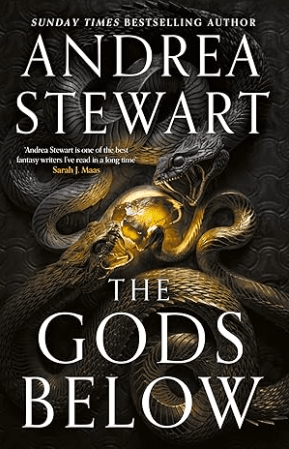
For all things fantasy, horror, and speculative fiction
Review Details
Review type: Book
Title: The Gods Below
Author: Andrea Stewart
Publisher: Orbit
Release date: 5th September 2024

Reviewed by: Steven Poore
Other details: Paperback RRP £9.99
The Gods Below by Andrea Stewart
Book Review
Steven Poore
Andrea Stewart’s debut, The Bone Shard Daughter, was one of the standout releases of 2020. Inventive and imaginative, balancing bleakness with cute sidekick monsters that chat back, it threw the reader into a fully formed world alongside the protagonist/narrator, and then proceeded to pull the ground from under everybody’s feet.
So I’ve come to The Gods Below with a certain level of expectation. If you are also expecting paired first-person lead narratives backed by several others written in third-person to draw in further background and help connect the dots, you won’t be wrong. And again we have a high concept, this time of god-altered realms – a sort of gradual “Rapture†crossing the world country by country, leaving a reduced and much changed population behind. Those who don’t want to be changed or disappeared by the god Kluehn wait for their eventual Armageddon in a dry world drained of resources, fighting desperately amongst themselves to keep Kluehn at bay.
It took me a while to get into The Gods Below – this series isn’t as immediate as The Drowning Empire. It doesn’t help that though we are introduced to our protagonist sisters, Hakara and Rasha right away, the god-sent reckoning quickly intervenes and splits them up, also adding in a time-skip of ten years. Stewart had already been laying the land, but now has to start over again, adding in reminiscences to account for the ten-year jump.
Once past that, however, and moving into the main plot of this first volume, Hakara and Rasha soon become easy to follow. Meanwhile, the third-person threads begin to weave through the narrative. Disgraced courtier’s daughter Sheuan and her acquaintance Mullayne are an interesting pair, the former showing us how the other half tries to live, while the latter gives an insight into (literally) how this world is built. And while Hakara is trying to learn how to fight against Kluehn, her sister is learning how to fight for Kluehn.
All the viewpoint characters are distanced from their families in one way or another, struggling to find some meaning in fellowship elsewhere. Found family is very much one of the central pillars of this book. But that doesn’t stop it from also being quite bloody and – in Sheuan’s case, at least – lustful. Being “altered†in one form or another is also a central theme – at the end of this book, none of the characters or relationships have survived unchanged.
Stewart’s voices are strong, though Hakara’s viewpoint can be a shade too brash or flippant for my taste. But this is a bold and confident step up from The Drowning Empire, a fast and furious beginning to a new series by an author who knows exactly what she’s doing.
Tags: FantasyHigh FantasyOrbitOrbit Books
Category: Book Review
All reviews
Latest Reviews:
- Basic Roleplaying: Creatures
- Five Mini-Adventures – PDF (Shadowdark RPG)
- Cursed Scroll Zine, Vol. 1: Diablerie! RPG Zine
- Empire of the Dawn by Jay Kristoff
- The God and the Gumiho by Sophie Kim
- Citadel of the Moon by Mike Chinn
- Hemlock and Silver by T. Kingfisher
- Thirsty by Lucy Lehane
- Solodark RPG
- Shadowdark RPG
Review tags:
Action (49) Adventure (70) Contemporary Fantasy (18) Fantasy (120) Gothic Horror (12) Harper Voyager (12) Historical Fantasy (14) Hodderscape (12) Horror (75) Orbit Books (33) Romance (28) Romantasy (12) Science Fiction (35) Titan Books (36) TorDotCom (12)
Leave a Reply